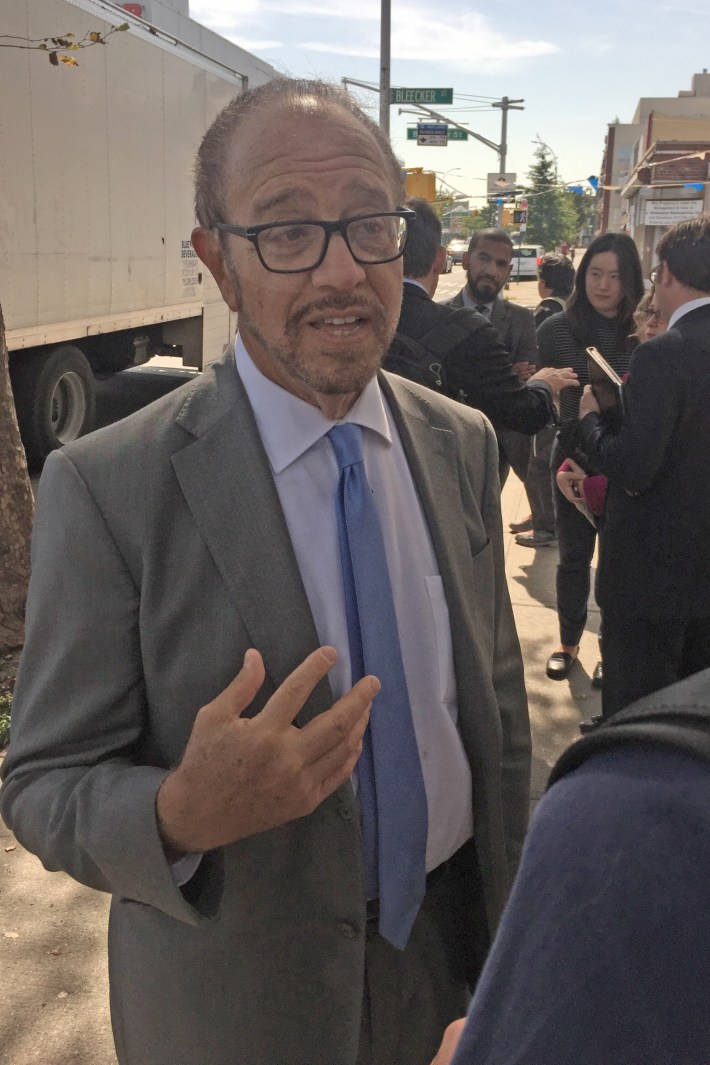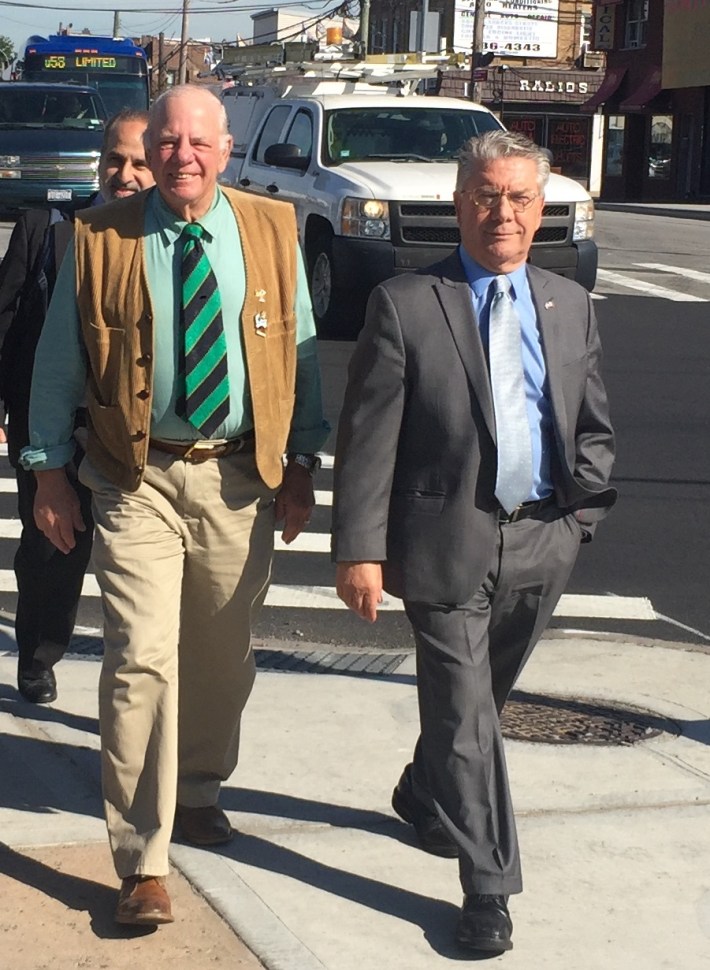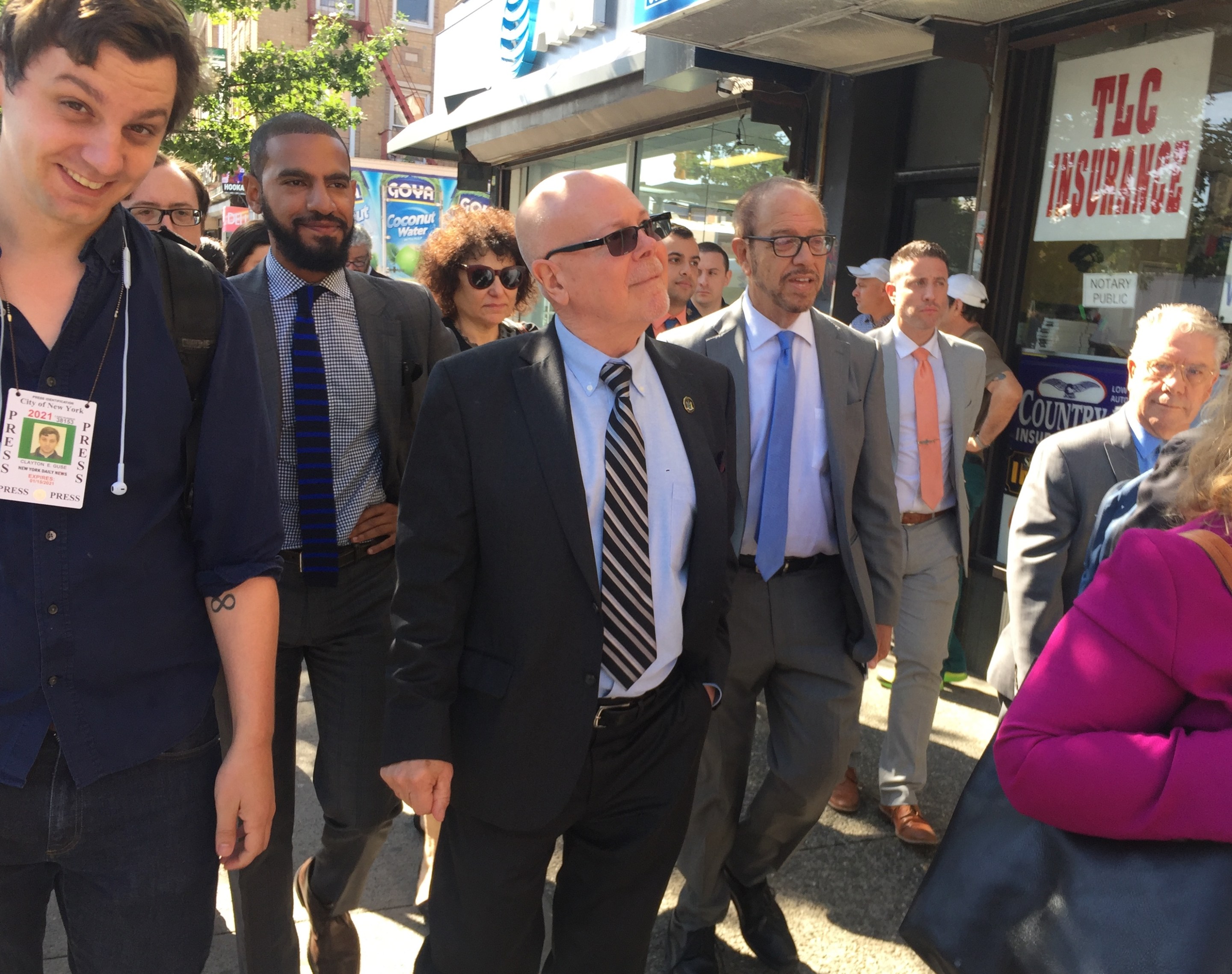How's this for irony?
As masses of people gathered in Lower Manhattan to protest government inaction on climate change on Friday, a Queens judge walked nine blocks of Fresh Pond Road in Ridgewood to help him decide if the city can prioritize tens of thousands of transit riders over a few dozen car owners.
Queens Supreme Court Justice Joseph Esposito toured the new bus-only lane on the commercial strip as part of his oversight of the latest lawsuit to stop the city from making fairly minor — and legal, city lawyers say — changes to the streetscape to improve transit service or safety. Prior cases include a lawsuit to block a lane reconfiguration on Morris Park Avenue in the Bronx, one to block a standard protected bike lane project on Central Park West, and another regarding a car-free "busway" on 14th Street in Manhattan.
Like the Fresh Pond Road suit, the busway litigation was filed by lawyer Arthur Schwartz, who argued in court papers that state law requires the city to do a detailed environmental review for projects that may shift where car drivers move or store their vehicles. City lawyers say only major construction projects require the mandated "hard look."
Esposito said he wanted to make the "hard look" himself — and unwittingly unleashed a circus on Fresh Pond Road. At various times, roughly 20 people were trailing Esposito including court officers, court officials, city Law Department officials, city Department of Transportation officials, lawyers for the plaintiffs, several of the leather-lunged plaintiffs themselves, reporters, photographers and people who just happened by.

Everyone (except the reporters) was offering opinions — in short, testifying, right there on the sidewalk — in hopes of swaying the judge. A court official constantly had to remind plaintiffs and city lawyers to stop talking. But the judge himself opened the door repeatedly, asking questions of both sides.
"Pictures, although they speak 1,000 words, don't tell the whole story," he said. "I want to see how the bus lane is going to impact the business community. That's why I'm here. You just can't tell me in a vacuum — and that was my problem with Mr. Schwartz the other day — that businesses are going to get hurt. Show me how!"
"We have empty stores!" screamed Tony Di Piazza, chairman of the Ridgewood-based L’Associazione Culturale Italiana Di New York.
"But they've been empty before now," Esposito responded.
"It'll get worse," Di Piazza said, still not under oath.
"If you document that, that's a different story," said Esposito, pausing in front of a discount store and gesturing towards it. "But you didn't come in here [the courtroom] and tell me that the Dollar Time store lost so much business in six months.
"It's a death knell!" Di Piazza added.
"We don't know if that's going to happen," Esposito said. "Maybe it won't happen. My thing is to be fair to the litigants and give you an opportunity to be heard."
But that's the question, isn't it? Esposito's walking tour was reminiscent of the O.J. Simpson case, when Judge Lance Ito and his jury toured various locations in the celebrated case. Like Ito, Esposito wanted to see the context for all the court papers he's been looking at. No, the Fresh Pond Road suit is not the Trial of the Century, but it does have vast ramifications to daily life in our city.

Schwartz has argued that the potential economic impact on businesses or the environmental impact of altered driving patterns are factors that the city must consider when it wants to reconfigure roadways — a similar same argument he made in the busway suit, and the same argument made by other lawyers in the Morris Park Avenue and Central Park West suits. All suits seek to overrule what the Department of Transportation considers its basic right under state law: to figure out the best way to move traffic, help transit riders and improve road safety — and then implement it.
“Petitioners’ claims are meritless," said city lawyer Nathan Taylor. "DOT considered all relevant information, including the concerns of local businesses, in reasonably deciding to create this bus lane. Also, like all traffic control devices, it is exempt from environmental review under [state environmental law].”
Streetsblog asked Esposito why his walking tour was even necessary, given that the law is the law, whether it's being implemented on 14th Street or Morris Park Avenue. If the law suggests that the city has the legal right to install a bus lane, no amount of walking on Fresh Pond Road can change that.
But Esposito said he believed that economic impact on the local businesses could be a factor — and the law may have tiny opening for such an interpretation. Esposito could find — as Schwartz argued in court papers — that the economic impact is so great that the city's bus lane amounts to an "arbitrary and capricious" act (even though buses would be sped up). And he could find — though it's a real stretch — that the lost parking represents a regulatory "taking," like in an eminent domain case. (City officials have studied parking in the area and find that many cars are just stored for hours and hours, a fact that reveals a flaw in the businesses' argument that the city, rather than residents, are taking away too much parking.)
Usually such arguments are made in court, not on a sidewalk. But this is what democracy looks like in a country where judges are elected officials, beholden even more to voters than they are to the law. And in a bizarre post-tour ad hoc press conference, Esposito's answer made it clear that voters are not far from his thoughts.
"This is Queens County. Ridgewood. And it's a special neighborhood like all of them are. Like Astoria. Or Elmhurst," he said. "I could go on and on. We are a community of diverse neighborhoods. And I want to get a feel for what is happening to this community. I had to come here. I am not doing this for publicity. I am doing it so I understand what the community is complaining about. The community board and elected officials don't like this [bus lane], but maybe this is the way of the future. Is the city anti-car? I don't know. You can argue that all day if you want. It's a very busy city. A lot of people. a lot of cars. a lot of traffic. Bike riders —"
"Bus riders," a city lawyer interjected.
"Bus riders," Esposito said. "And we all have to live together. We're trying to make it work. We're not trying to hurt anybody."
"Businesses matter!" Di Piazza yelled out.
"They do," Esposito said. "But also trying to make progress matters. Life changes."
At several times during the tour, Di Piazza and Esposito talked about Astoria, another Queens neighborhood (and one where Esposito's family has owned delicatessens) famous for its lack of parking. Di Piazza claimed that the city's bus lane plan in Ridgewood would make things equally difficult for drivers, but Esposito disagreed.
"Astoria is much worse than this," he said. "You can't park anywhere. But there's plenty of parking here."
Indeed, in Ridgewood, city officials created 66 metered parking spaces on the side streets to help businesses. On Friday morning, the strategy was working, with ample parking in all the metered areas. Local real estate broker Andrew Gouzoulis of Krisch Realty admitted that the metered parking creates lots of spaces during the day, but said conditions change in the late afternoon — just when the city's dedicated bus lane eats up out 70 metered spaces on Fresh Pond Road.
"All the residents, they come home from work and can't park," he said. "Will this plan make the buses move faster? Yes. They have their own lane! But you're changing the economics of the area to save just two minutes. Now the residents can't park. They like this community. And that's one reason to live here. They like their cars." ("They like their cars" is hardly a strong legal argument, the judge was repeatedly reminded.)
It's also funny that Astoria kept coming up. Yes, it is difficult for car owners to find parking in that neighborhood. But despite (or perhaps because of!) the lack of parking, Astoria is also one of the most vibrant, transit-friendly commercial areas of the city with a mix of old shops and newer businesses catering to recent immigrants from pricier neighborhoods to the south and west. So as a legal — and real life — argument, it's specious to say that limited parking is bad the business community.
Esposito was asked if he empathizes more with the businesses on Fresh Pond Road than the city bus riders, given his family background.
"I can empathize. My family had delicatessens in Astoria. Parking was always the problem," he said. "But that doesn't mean I can't be fair to both sides."
Esposito ordered both sides back to court on Monday — and claimed he would issue a verdict on Wednesday.






